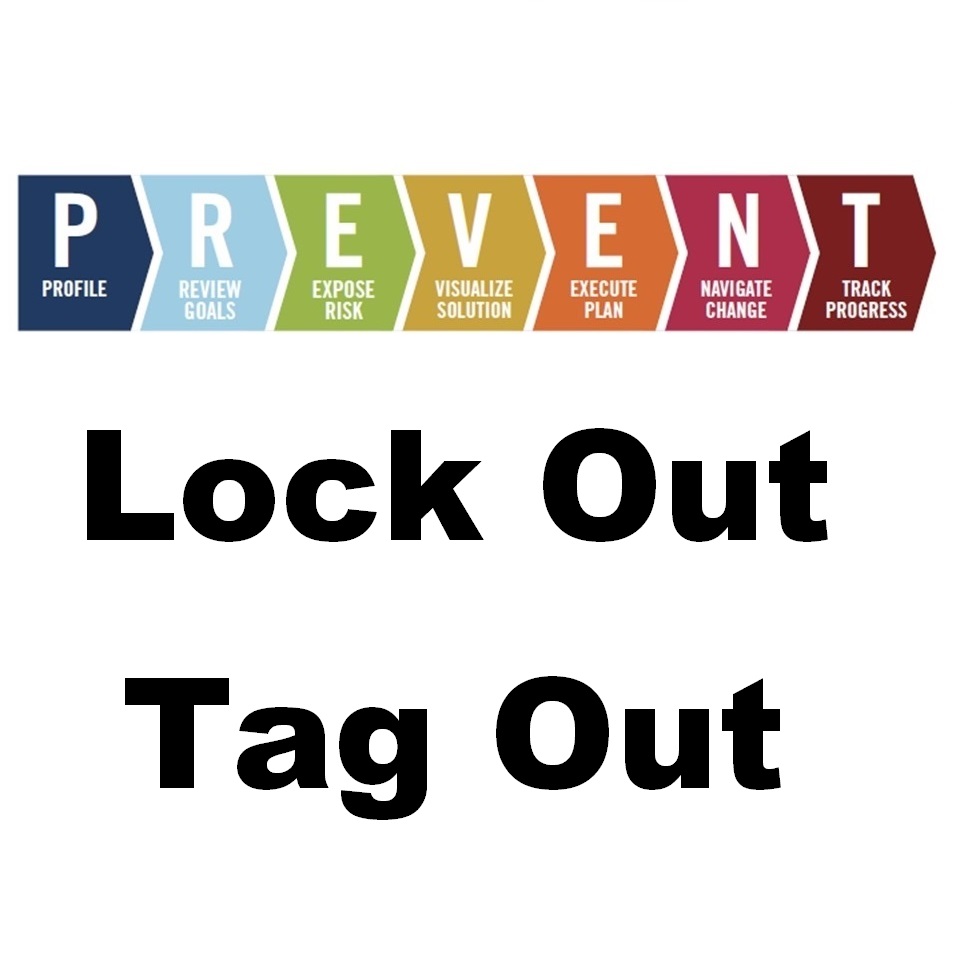Information
-
Client / Site
-
Conducted on
-
Prepared by
-
Equipment Name/Model Number:
-
Photograph of equipment:
-
Scope: Utilize this procedure for any maintenance or servicing of aforementioned equipment:
Purpose: To protect authorized employees against unexpected activation of equipment or energy while servicing equipment.
Authorization: The plan administrator (as defined in Patterson written lockout program) is responsible for all procedural steps.
Enforcement: Failure to properly follow lockout/tagout procedures may result in disciplinary action.
Notify affected personnel that Lockout/Tagout is Being Performed
Isolation Devices & Details
Step 1 / Appendix 1
-
Type of Energy
- Electrical 600V AC
- Electrical 480V AC
- Electrical 277V AC
- Electrical 240V AC
- Electrical 220V AC
- Electrical 208V AC
- Electrical 110/120V AC
- Electrical 90V DC
- Electrical 48V DC
- Electrical 36V DC
- Electrical 24V DC
- Electrical 12V DC
- Electrical 6V DC
- Pneumatic 0-15 PSI
- Pneumatic 0-30 PSI
- Pneumatic 50 PSI
- Pneumatic 0-60 PSI
- Pneumatic 80-120 PSI
- Pneumatic 0-125 PSI
- Pneumatic 150 PSI
- Pneumatic 0-150 PSI
- Pneumatic 750 PSI
- Pneumatic 2500 PSI
- Hydraulic 0-100 PSI
- Hydraulic 0-1000 PSI
- Hydraulic 0-2000 PSI
- Hydraulic 0-3000 PSI
- Gravity 50-100 Lbs
- Gravity 200-300 Lbs
- Mechanical / Gravity 0-100 Lbs
- Mechanical / Gravity 0-1000 Lbs
- Mechanical / Gravity 1000+ Lbs
- Steam / Thermal/ Heat
- Natural Gas
-
Describe where the energy isolation point is located:
-
Photo of where the energy isolation point is located:
-
Describe how to disconnect (de-energize) this energy source:
-
Identify the device required for lockout/tagout:
- Lock & Tag
- Plug Lock Device
- 1/4 Turn Valve Cover
- Circuit Breaker Device
- Cable Device
- Other
Step 2 / Appendix 2
-
Type of Energy
- Electrical 600V AC
- Electrical 480V AC
- Electrical 277V AC
- Electrical 240V AC
- Electrical 220V AC
- Electrical 208V AC
- Electrical 110/120V AC
- Electrical 90V DC
- Electrical 48V DC
- Electrical 36V DC
- Electrical 24V DC
- Electrical 12V DC
- Electrical 6V DC
- Pneumatic 0-15 PSI
- Pneumatic 0-30 PSI
- Pneumatic 50 PSI
- Pneumatic 0-60 PSI
- Pneumatic 80-120 PSI
- Pneumatic 0-125 PSI
- Pneumatic 150 PSI
- Pneumatic 0-150 PSI
- Pneumatic 750 PSI
- Pneumatic 2500 PSI
- Hydraulic 0-100 PSI
- Hydraulic 0-1000 PSI
- Hydraulic 0-2000 PSI
- Hydraulic 0-3000 PSI
- Gravity 50-100 Lbs
- Gravity 200-300 Lbs
- Mechanical / Gravity 0-100 Lbs
- Mechanical / Gravity 0-1000 Lbs
- Mechanical / Gravity 1000+ Lbs
- Steam / Thermal/ Heat
- Natural Gas
-
Describe where the energy isolation point is located:
-
Photo of where the energy isolation point is located:
-
Describe how to disconnect (de-energize) this energy source:
-
Identify the device required for lockout/tagout:
- Lock & Tag
- Plug Lock Device
- 1/4 Turn Valve Cover
- Circuit Breaker Device
- Cable Device
- Other
Step 3 / Appendix 3
-
Type of Energy
- Electrical 600V AC
- Electrical 480V AC
- Electrical 277V AC
- Electrical 240V AC
- Electrical 220V AC
- Electrical 208V AC
- Electrical 110/120V AC
- Electrical 90V DC
- Electrical 48V DC
- Electrical 36V DC
- Electrical 24V DC
- Electrical 12V DC
- Electrical 6V DC
- Pneumatic 0-15 PSI
- Pneumatic 0-30 PSI
- Pneumatic 50 PSI
- Pneumatic 0-60 PSI
- Pneumatic 80-120 PSI
- Pneumatic 0-125 PSI
- Pneumatic 150 PSI
- Pneumatic 0-150 PSI
- Pneumatic 750 PSI
- Pneumatic 2500 PSI
- Hydraulic 0-100 PSI
- Hydraulic 0-1000 PSI
- Hydraulic 0-2000 PSI
- Hydraulic 0-3000 PSI
- Gravity 50-100 Lbs
- Gravity 200-300 Lbs
- Mechanical / Gravity 0-100 Lbs
- Mechanical / Gravity 0-1000 Lbs
- Mechanical / Gravity 1000+ Lbs
- Steam / Thermal/ Heat
- Natural Gas
-
Describe where the energy isolation point is located:
-
Photo of where the energy isolation point is located:
-
Describe how to disconnect (de-energize) this energy source:
-
Identify the device required for lockout/tagout:
- Lock & Tag
- Plug Lock Device
- 1/4 Turn Valve Cover
- Circuit Breaker Device
- Cable Device
- Other
Verify the De-energization of all energy sources
-
Lockout Removal Process:
1 - Inspect the work area to verify all tools, equipment, and materials have been removed 2 - Verify that controls are neutral 3 - Remove devices in reverse order 4 - Notify employees that work is complete -
Developed/Reviewed By (Name):
-
Periodic inspection conducted by:
-
Date of Lockout Creation / Update / Review:














